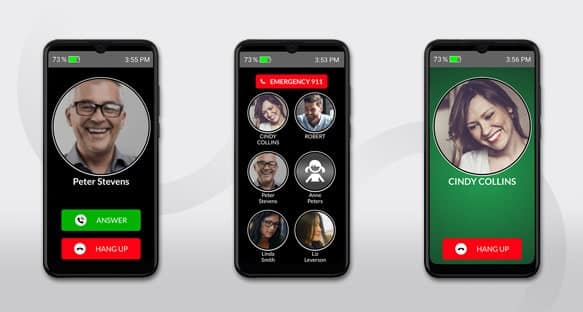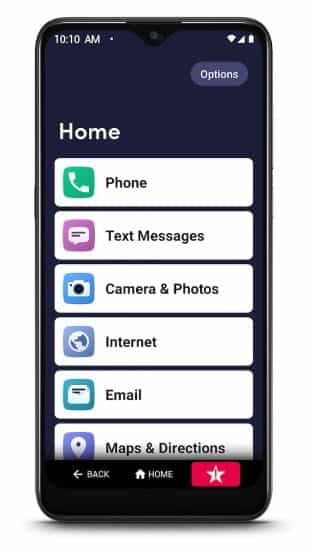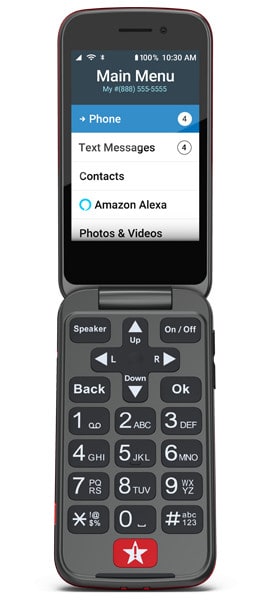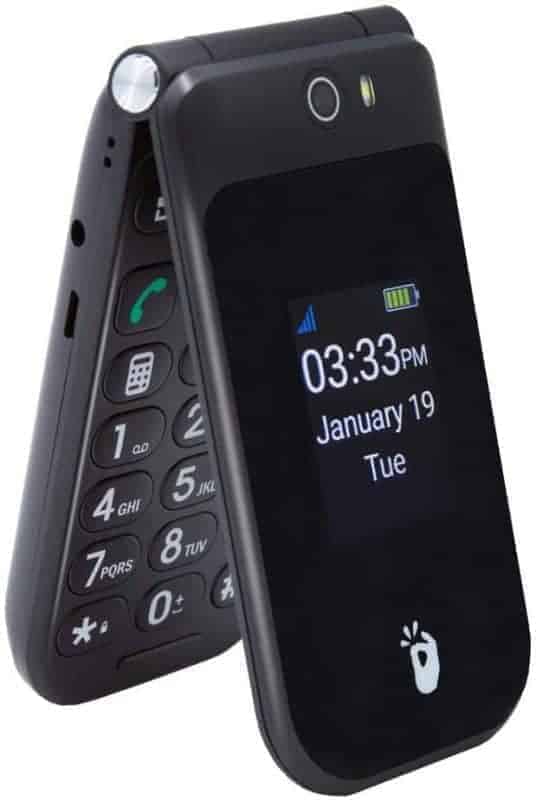For caregivers watching a loved one age can be an emotional and confusing time. It will prove to be even more challenging for people experiencing signs of dementia, including memory loss, disorientation, confusion, and difficulty communicating.
According to Alzheimer's Disease International, someone develops dementia every three seconds. As a caregiver, you can help this by recommending some lifestyle changes like quitting smoking and exercising; they also have medications for memory loss that you can try. Of course, checking with your doctor is the best course of action.
If you care for a person experiencing these symptoms, loneliness often goes along with aging, and having a lifeline to everyday life is needed. You can help by upgrading their cell phone.
Here are a few phones you can check out.
RAZ Memory Phone

The RAZ Memory phone is the only phone designed for those with dementia or Alzheimer's; the basic approach was to make the phone easy to use, take out the complication of new cell phones, and give it one function: to make calls. The phone has a 6.3-inch display, which also helps people who have vision loss. It comes with headphones a headphone jack at the top with a slot for an SD card on the side. The battery is not replaceable or removable.
The one screen has room for six contacts with pictures and the name of the contact below. If you need more contacts, there is an option for up to 24 contacts. The caregiver controls this function. There is a button to call 911 or to call the RAZ Emergency Service. The user doesn't have to push any digits; press the picture of the contact they want to reach, and it calls. There is no menu system, no apps, no text messaging. The volume button is disabled; the screen doesn't ever “lock” or “go to sleep.” An easy-to-use online portal manages the phones' features; the caregiver can access the signal strength and battery amount if they cannot reach the user.
RAZ Emergency Service includes an optional emergency service; the service is intended for cases where individuals with dementia imagine emergencies and call 911 repetitively. With this new service, emergency calls can be directed to an emergency dispatch agent rather than 911. The agent will know that the caller suffers from memory loss and will determine whether to contact 911 guided by this knowledge. Also, text messages will be sent to up to three (3) caregivers, providing these designated individuals the opportunity to cancel the emergency call, avoiding an unnecessary call to 911. The service costs either $79.99 annually or $7.99 per month with an activation fee of $19.99.
Price and Wireless Service
There are two phone versions; one version costs $309 and works on T-mobile and wireless resellers who use T-mobile services, like Mint Mobile, Metro by T-mobile, Ting, and Simple Mobile. It does not work on Verizon, AT&T, or wireless providers who resell their service.
The other version of the $349 and works with AT&T, Verizon as well as T-mobile. This phone will work on Cricket, Consumer Cellular, Straight Talk, NET10, and Metro by T-mobile. The phone comes with a free SIM card and three free months of Mint Mobile service.
Jitterbug Smart

The Jitterbug Smart is simple to use; one screen “smartphone” can also be used as a medical alert device with the dedicated urgent response button, giving you access to 24/7 live agents on-hand with varying service levels.
This device offers a phone, camera, a web browser, with no physical buttons, provides the right amount of technology.
Cost: $74.99 plus activation and monthly plan
Jitterbug Flip

The perfect phone for someone with dementia to stay in touch, and they are compatible with hearing aids as well. They have large physical buttons that make them easy to operate. It allows for voice commands to make calls and send messages by speaking.
Some people may use this phone for its medical alert capabilities; Lively's health and safety features have a dedicated urgent response button that connects to a monitored service with agents who will help with anything needed. For example, if the user is lost, the agent can help, or if required, contact the emergency contacts or alert first responders if necessary.
Using the Lively app, caregivers can keep track of their loved ones and have peace of mind they will recieve notifications about emergency calls, battery levels, and location information. The Jitterbug Flip can help a loved one stay independent and safe at the same time.
Cost: $49.99, plus activation and monthly plan
Snapfon ezTWO3g

The SnapFon phone has an SOS button that will sound a 120 dB alarm and send a text message to a preset list of contacts. They also have an additional subscription service – sosPlus Mobile Monitering, starting at $15/month for access to trained first responders that have experience with medication, health needs, family contacts, and physician information. Other service features include the ability to track the user and make a plan if the user is non-responsive.
Cost: $29.99 plus activation fees and service plans
Conclusion
For dementia patients, they might experience some problems when using a regular phone. This is why several recommended phones can use to keep in touch with their friends and families. These phones are equipped with excellent audio output, a large screen display, easy-to-read buttons, and fantastic simplicity to make it easier for seniors to communicate through cellphones. Some of the best cellphones for dementia patients have been discussed above.


